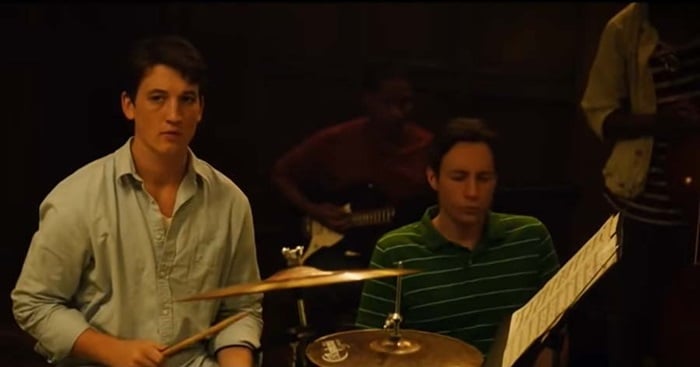The ending of the 2014 film Whiplash, written and directed by Damien Chazelle, encapsulates the core themes of the movie – ambition, obsession, mentorship, and the price of excellence. To better appreciate the ending, let us peek into the plot, the characters of Andrew Neiman and Terence Fletcher, their evolving relationship, and the powerful finale.
Plot Summary

Whiplash follows the story of Andrew Neiman (Miles Teller), a talented and ambitious young jazz drummer at the fictional Shaffer Conservatory of Music. He aspires to be one of the greatest drummers in the world, and his life takes a significant turn when he's selected to join the prestigious studio band led by the notoriously demanding conductor and music instructor Terence Fletcher (J.K. Simmons).
As the movie unfolds, Andrew endures relentless physical and psychological abuse from Fletcher in his pursuit of perfection. Whiplash explores themes of the sacrifices required for greatness, the tension between mentor and protege, and the question of how far one is willing to go to achieve success.
Character Analysis
Andrew Neiman: Andrew is a highly dedicated and talented young drummer with a single-minded determination to become one of the greats. He is initially eager to impress Fletcher and pushes himself to the limits to meet Fletcher's impossibly high standards. As the film progresses, we witness Andrew's growing obsession with perfection, which leads him to sacrifice his health, relationships, and emotional well-being.
Terence Fletcher: Fletcher is a complex character who serves as both mentor and antagonist. He is an incredibly demanding and abusive teacher who believes that fear and intimidation are necessary to push students to achieve greatness. Throughout the film, his harsh methods create significant conflict and tension. Fletcher's character raises questions about the morality of his approach and the lengths to which a mentor can push a protege.
The Climactic Scene:
The climax of Whiplash occurs during the final performance of the studio band at the prestigious JVC Jazz Competition. Andrew, now the core drummer, is determined to prove himself to Fletcher. The band performs "Caravan," and it's a high-stakes moment with everything on the line.
As the performance unfolds, the tension between Andrew and Fletcher reaches its zenith. Andrew senses that Fletcher may try to sabotage the performance by starting the song with an unexpected tempo. In response, Andrew decides to take control and counts in the band himself, a bold move that risks the entire performance. In this moment, Andrew fully embraces his role as a leader, taking a risk that could either lead to disaster or triumph.
The performance is electrifying and filled with suspense. As Andrew and the band navigate the complexities of "Caravan," there's a sense of both chaos and genius. The audience, much like the characters, is on the edge of their seats, unsure of what will happen next.
Just as the performance seems to be reaching a triumphant crescendo, Fletcher abruptly stops the music and berates Andrew for his actions. This moment is pivotal – it's a final test of Andrew's resolve and determination.
The Ending Sequence
After the intense confrontation during the performance, the film takes a brief pause. Andrew is expelled from the band, his dreams seemingly shattered. He moves on with his life and enrolls in a different music school.
However, the story doesn't end there. Andrew's journey has been profoundly affected by his time under Fletcher's mentorship, for better or worse. He has transformed into a formidable drummer, even if the path to greatness was painful and demanding.
The final sequence of Whiplash showcases Andrew playing in a small jazz club. As he starts drumming, the camera pans to Fletcher, who is in the audience. Fletcher is captivated by Andrew's performance, and there's a sense of respect and admiration in his expression. It's a striking moment of redemption, where Andrew's talent and ambition have earned the approval of his demanding mentor.
The ending of Whiplash is ambiguous, with Andrew and Fletcher locked in a tense stare. It's a concluding note that leaves room for interpretation – it's a confrontation between mentor and protege, a complex moment that blurs the lines between approval and disapproval, and an acknowledgment of the intense and complicated relationship they share.
Themes and Interpretation
The ending of Whiplash encapsulates several central themes:
Ambition and Sacrifice: Andrew's journey is marked by his unrelenting ambition to become one of the greatest drummers. The ending reflects the sacrifices he has made in pursuit of that goal, highlighting the steep price of excellence.
Mentorship and Obsession: The complex and often toxic mentor-protege relationship between Andrew and Fletcher comes to a head in the film's conclusion. The ending showcases the impact of Fletcher's demanding and abusive mentorship on Andrew's development.
The Nature of Greatness: The ending invites viewers to contemplate the nature of greatness. What does it mean to achieve excellence, and how far should one go to attain it? Whiplash doesn't provide a clear answer but raises these questions for consideration.
Redemption and Resolution: The final sequence of Whiplash implies a form of redemption for both Andrew and Fletcher. Andrew's extraordinary drumming skills have earned the respect of his mentor, and Fletcher seems to find a sense of satisfaction in witnessing Andrew's performance.
The Ambiguity of the Ending
One of the strengths of Whiplash" is its ability to leave the ending open to interpretation. It doesn't offer a neatly resolved conclusion but rather encourages viewers to reflect on the characters and their journey. The intense stare-down between Andrew and Fletcher in the final moments invites questions about the emotional and psychological toll of their relationship. The ending of Whiplash challenges the audience to grapple with the complexities of ambition, mentorship, and the pursuit of greatness.






